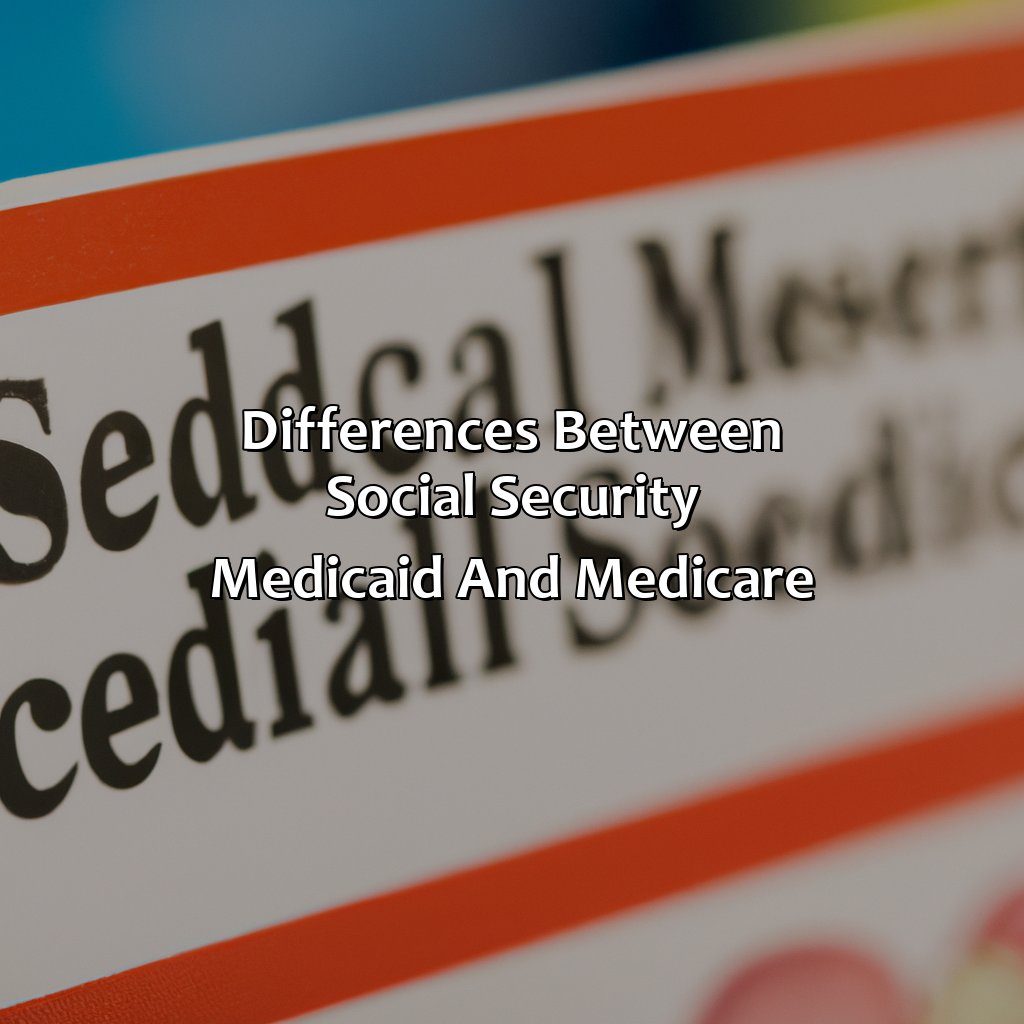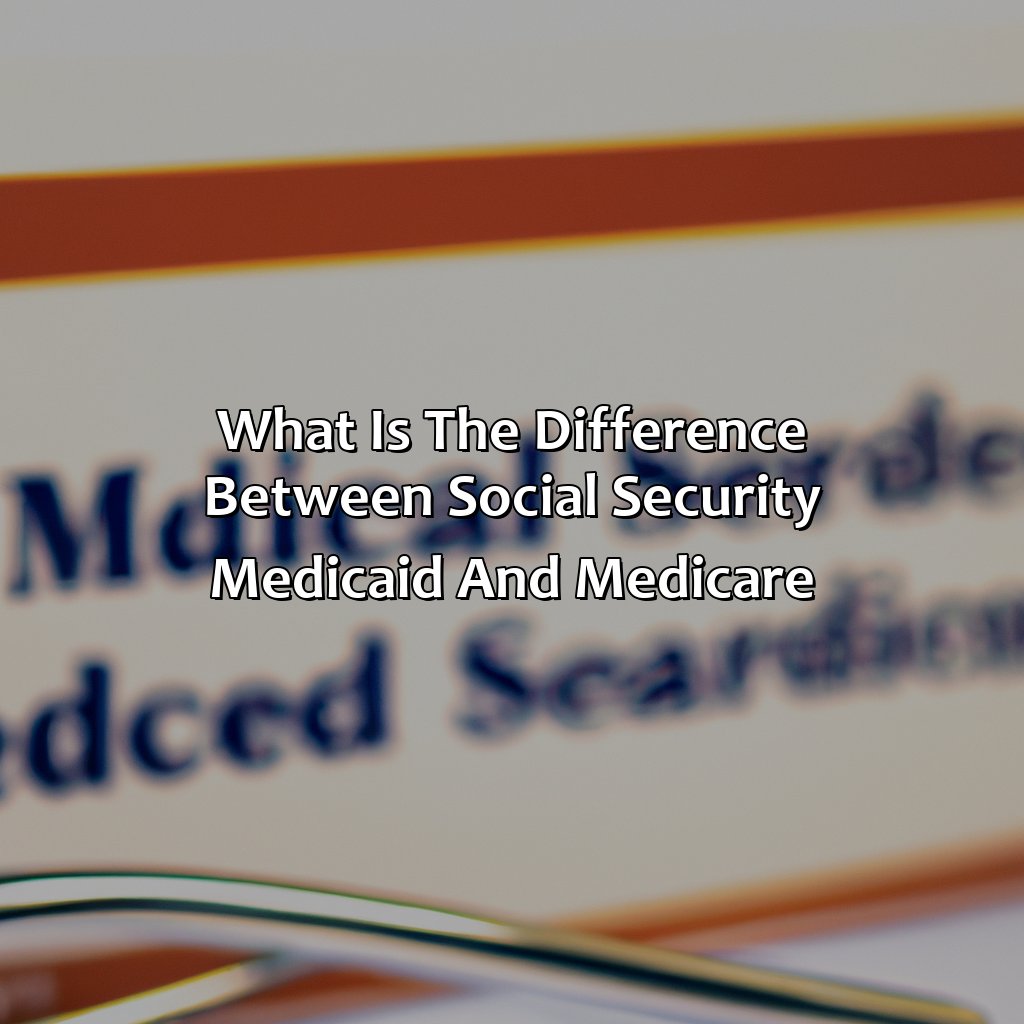What Is The Difference Between Social Security Medicaid And Medicare?
Key Takeaway:
- Social Security provides retirement, disability, and survivor benefits to eligible individuals who have contributed to the program through payroll taxes. Medicaid and Medicare are government healthcare programs that provide medical coverage to eligible individuals.
- Medicaid is primarily for low-income individuals and families, providing coverage for medical expenses such as doctor visits, hospital stays, and prescription drugs. Medicare is primarily for individuals who are 65 or older, or those with certain disabilities, providing coverage for hospital visits, medical services, and prescription drugs.
- A key difference between these programs is the criteria for eligibility – while Social Security is based on contributions made through payroll taxes and age, Medicaid eligibility is based on income and other factors, and Medicare is primarily based on age and disability status.
Confused about the difference between Social Security Medicaid and Medicare? You are not alone. Get informed about these programs and their functions to ensure you get the best coverage that best fits your needs.
What is Social Security?
Want to comprehend Social Security benefits? Eligibility criteria and different benefits must be known. This will help you understand how Social Security works. Is it applicable to you? We’ll discuss eligibility for Social Security benefits. Plus, the various types of benefits available.

Image credits: retiregenz.com by Harry Duncun
Eligibility for Social Security benefits
Individuals can check if they qualify for Social Security benefits by meeting certain criteria. These include age, status as a surviving spouse or child, disability, and work history. Eligibility requirements may vary depending on the type of benefit sought.
Moreover, eligibility for Social Security benefits is not the same as Medicaid or Medicare. While Social Security provides financial assistance to eligible individuals who have reached retirement age or are disabled, Medicaid is a program that offers health coverage to low-income individuals and families. Medicare, on the other hand, is a federal health insurance program primarily designed for people aged 65 and over.
Although eligibility for Social Security benefits can be complicated, there are resources available to help individuals understand their options. For example, contacting the Social Security Administration or visiting their website can provide valuable information regarding benefits and eligibility requirements.
In one instance, Olivia applied for Social Security disability benefits after being diagnosed with a severe medical condition that left her unable to work. Despite initial setbacks in the application process, Olivia was ultimately approved for benefits and was able to receive financial assistance during her time of need.
Get ready to feel like Oprah handing out cars, because everyone gets a social security benefit!
Types of Social Security benefits
Social Security Benefit Types are payments provided to individuals and their family members who have worked and earned enough credits. Here are the different types of Social Security benefits:
- Retirement Benefits – Paid to retired workers aged 62 or older
- Disability Benefits – Paid to individuals who become disabled before reaching retirement age
- Survivor Benefits – Paid to the surviving spouse, children, and dependents of a deceased worker
- Spousal Benefits – Paid to the spouse of a retired, disabled, or deceased worker
- Dependent Benefits – Paid to minor children and disabled adult children who are dependents of a retired, disabled, or deceased worker.
Apart from these benefits, eligible beneficiaries can also receive healthcare coverage through Medicare and Medicaid programs. However, it is imperative to know that Medicare and Medicaid are not Social Security programs but are federal health insurance programs for people meeting certain criteria.
Lastly, it is recommended to check with your local social security office or online at ssa.gov regularly. It ensures one does not miss out on any updates and receives full benefits they may be eligible for.
Why rely on luck when you can have Medicaid?
What is Medicaid?
Got questions on Medicaid? Read on! Medicaid is a program funded by both state and federal governments. It provides services to people with low income. This article will explain two main topics:
- Eligibility for Medicaid
- The services it offers

Image credits: retiregenz.com by James Duncun
Eligibility for Medicaid
Accessing Medical Aid through Medicaid
Medicaid provides medical assistance to low-income individuals in the United States. Eligibility for Medicaid is primarily based on an individual’s income, household size, and citizenship or residency status. In addition to income, other factors such as pregnancy, disability, and age are taken into account for qualifying.
Individual states manage their own Medicaid programs within federally-set guidelines. The Medicaid program covers a range of health services including hospitalization, doctor visits, long-term care, as well as prescription drugs and some preventive care services.
It is important to note that eligibility requirements for Medicaid may differ from state to state. Therefore, it is vital to consult with state authorities or get information through Health Insurance Marketplace while applying for medical assistance.
In Mississippi and Wyoming, nearly 70% of nursing home residents rely on Medicaid coverage. Georgia also relies heavily on Medicaid funding for supporting its medically grounded disabled population.
To conclude, understanding the detailed eligibility criteria for receiving benefits under the national insurance scheme of Medicare can be difficult; therefore seeking help from a qualified professional can ease one’s journey towards acquiring medical aid through Medicare.
Don’t worry, if you can’t afford health care, there’s a type of Medicaid service for that.
Types of Medicaid services
Medicaid Services Explained
Medicaid services are a system of programs designed to provide healthcare coverage for low-income individuals and families. Medicaid services help people pay for medical expenses, and the types of services provided can vary depending on the state in which they live. Here are some of the commonly offered Medicaid services:
- – Primary Care: This includes doctor visits, preventative care, and other healthcare services.
- – Hospitalization: If you need to stay in the hospital for treatment or surgery, your Medicaid benefits may cover the costs associated with this type of care.
- – Prescription Drugs: Some states offer prescription drug coverage as part of their Medicaid services.
Understanding Medicaid eligibility can be complicated, and there are many rules that apply to enroll in these programs. It’s essential to check with your state to discover which Medicaid services you are eligible for if you’re considering this option.
Did You Know?
Some states have expanded their Medicaid programs beyond what is required by the Affordable Care Act? As a result, millions more Americans now have access to affordable health insurance through these programs.
True Story:
When Jane was diagnosed with cancer, she didn’t know how she would afford treatment without health insurance. Fortunately, she was eligible for her state’s Medicaid program, which paid for all her chemotherapy treatments. Without it, Jane may not have survived her battle with cancer.
Medicare: the government’s way of reminding you that age comes with its own set of problems.
What is Medicare?
If you want to understand Medicare – a health insurance program for seniors and those with disabilities – you need to be aware of eligibility and the kinds of plans it offers. We’ll cover this in our “What is Medicare?” section, which has information on Eligibility for Medicare and Types of Medicare plans. In no time, you’ll comprehend how Medicare works and its range of plans.

Image credits: retiregenz.com by Joel Jones
Eligibility for Medicare
To be eligible for Medicare, individuals must meet certain criteria including age, disability or end-stage renal disease. Individuals who are 65 years or older and have lived in the United States for at least five years are generally eligible. Those who have been receiving Social Security disability benefits for 24 months or who have end-stage renal disease may also qualify.
Additionally, there are different parts of Medicare that offer different coverage options such as hospital insurance (Part A), medical insurance (Part B) and prescription drug coverage (Part D). Eligibility for each part varies based on specific requirements related to age, disability status and premiums paid.
It’s essential to understand these eligibility requirements to ensure proper enrollment and access to healthcare services provided by Medicare. Remember that eligibility requirements may change over time, so it’s crucial to stay up-to-date with any updates or changes to the program.
Pro Tip: Working with a qualified healthcare advisor can help navigate through complex Medicare regulations and ensure maximum benefit coverage.
Choosing a Medicare plan is like trying to navigate a maze, except the walls are made of confusing terminology and bad puns.
Types of Medicare plans
When it comes to Medicare plans, there are various options available. The choices can be overwhelming, but we have simplified them for you.
- Original Medicare (Part A and Part B)
- Medicare Advantage (Part C)
- Prescription Drug Coverage (Part D)
- Medigap (Supplemental Insurance)
- Special Needs Plans (SNPs)
Original Medicare is available to anyone who qualifies for it, while Medicare Advantage is a private insurance alternative that offers additional benefits. Prescription drug coverage and Medigap supplement Original Medicare while Special Needs Plans cater to beneficiaries with specific needs.
There are some unique details that you should note about these plans. For instance, Prescription Drug Coverage can only be added to Original Medicare or certain types of Medicare Advantage plans.
Don’t miss out on the benefits of having the right Medicare plan. Do your research and consult with an expert to find the plan that best suits your needs and protects you from unexpected medical expenses.
Trying to understand the differences between Social Security, Medicaid, and Medicare is like trying to decipher a foreign language, but with more acronyms.
Differences between Social Security, Medicaid and Medicare
Know that each program has its purpose. To comprehend the difference between Social Security, Medicaid, and Medicare, consider coverage for healthcare costs, eligibility rules, and funding sources. Let us delve deeper into each one for an improved understanding of how they differ.

Image credits: retiregenz.com by Harry Washington
Coverage for healthcare expenses
For those seeking coverage for medical expenses, there are various options available depending on their eligibility and needs. Social Security provides retirement, disability, and survivor benefits to individuals who have contributed to the program through payroll taxes. Medicaid is a joint federal and state program that offers healthcare coverage to low-income individuals and families who meet certain eligibility criteria. Medicare is a federal health insurance program primarily intended for people aged 65 or older, as well as those with disabilities or end-stage renal disease.
Medicare covers a range of healthcare services, including hospital care, doctor visits, preventive services, prescription drugs, and more. Medicaid also covers many medical services, including doctor visits, hospital stays, long-term care, behavioral health services, and dental care in some cases. Social Security benefits are based on an individual’s work history and contributions to the program throughout their career.
It is important to note that while these programs cover some healthcare expenses, they may not cover everything. Many people choose to supplement their coverage with private insurance plans or Medigap policies. Additionally, each of these programs has its own eligibility requirements and application process.
Interestingly enough, Social Security was not created with the intention of providing a full-fledged retirement plan for Americans. Rather it was used as an income protection plan for people who were no longer able to work due to old age or disability.
If getting older is supposed to come with perks, eligibility criteria for Social Security, Medicaid, and Medicare are certainly not them.
Eligibility criteria
To qualify for Social Security, individuals need to have accumulated enough credits through employment history. Medicaid is an income-based healthcare program that may be available to individuals with low-income and limited financial resources, whereas Medicare is a federal health insurance program for those aged 65 and over or those with certain disabilities. Additionally, eligibility for Medicaid and Medicare can also depend on citizenship status and other criteria specific to each program. Understanding the different eligibility requirements is crucial when considering which program(s) may be available and suitable.
Funding for these programs is like a game of musical chairs – except there are never enough chairs and everyone is fighting for them.
Funding sources
Funding for Social Security, Medicaid and Medicare
Social Security, Medicaid and Medicare are government-funded programs that provide assistance to different segments of the population. The following points showcase the different funding sources for these programs:
- Social Security is funded through taxes paid by workers and their employers.
- Medicare is funded through a combination of payments made by beneficiaries and the federal government.
- Medicaid is jointly funded by federal and state governments.
- Part A of Medicare (hospital insurance) is mostly financed through payroll taxes while Part B (doctor visits) and Part D (prescription drugs) are partially financed by premiums paid by participants.
- The federal government provides most of the funds for social security, although it is financed by payroll taxes collected from both employees and employers.
- For Medicaid, the federal government pays a matching percentage of state expenditures; this percentage varies based on the state’s per capita income compared to the national average.
It’s worth noting that premiums may vary depending on earnings or coverage level.
In addition to premiums, deductibles, coinsurance and copayments can add up quickly across all three plans. It’s important to understand your coverage options early in order to make informed decisions.
Don’t risk missing out on crucial health benefits – take control of your healthcare today!
Five Facts About the Difference Between Social Security, Medicaid, and Medicare:
- ✅ Social Security is a federal program that provides retirement, disability, and survivor benefits to eligible individuals and their families. (Source: SSA)
- ✅ Medicaid is a joint federal and state program that provides health coverage for low-income individuals and families, including children, pregnant women, and those with disabilities. (Source: Medicaid.gov)
- ✅ Medicare is a federal program that provides health coverage for individuals aged 65 and older, as well as those with certain disabilities. (Source: Medicare.gov)
- ✅ Social Security and Medicare are both funded through payroll taxes, while Medicaid is funded by both federal and state governments. (Source: AARP)
- ✅ Eligibility and benefits for Social Security, Medicaid, and Medicare vary based on factors such as income, age, and disability status. (Source: HealthCare.gov)
FAQs about What Is The Difference Between Social Security Medicaid And Medicare?
What is the difference between Social Security, Medicaid, and Medicare?
Social Security is a federal program that provides income to retired or disabled individuals. Medicaid is a health insurance program for low-income individuals and families. Medicare is a health insurance program for people who are 65 or older.
Who is eligible for Medicaid?
Eligibility for Medicaid varies by state and usually depends on income and family size. In general, low-income individuals and families, children, pregnant women, and individuals with disabilities may be eligible for Medicaid.
Who is eligible for Medicare?
Most individuals who are 65 or older are eligible for Medicare. Some individuals who are younger than 65 may also be eligible if they have certain disabilities or health conditions.
What does Social Security cover?
Social Security provides income to retired or disabled individuals, as well as to their spouses and children. The amount of income received depends on the individual’s earnings history.
What does Medicaid cover?
Medicaid covers a wide range of medical expenses, including doctor visits, hospital stays, prescription drugs, and more. The specific benefits covered may vary by state.
What does Medicare cover?
Medicare covers a wide range of medical expenses, including doctor visits, hospital stays, prescription drugs, and more. However, some services may require a copay or deductible.
